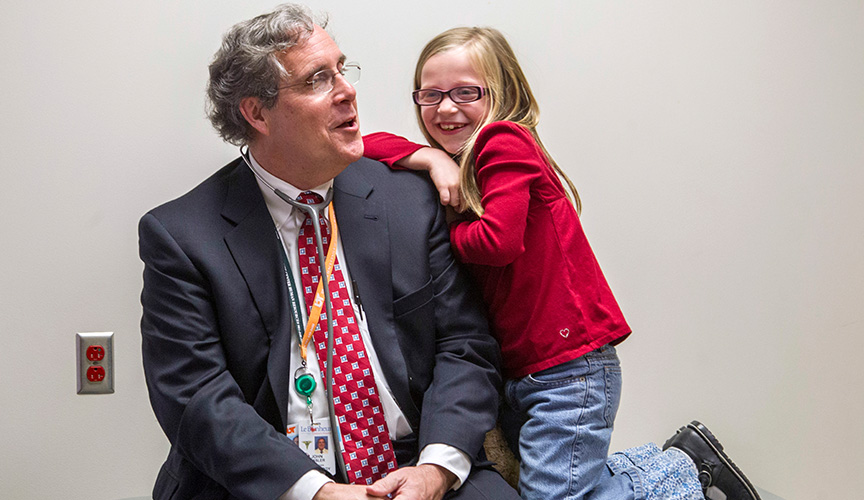A First Line of Defense
Pediatric Nephrologist John Bissler, MD, is changing the face of treatment for tuberous sclerosis patients living with tumors, elevating drug therapy to the top of the list of proven treatments.
A long-term, multi-center follow-up study of tuberous sclerosis (TS) and lymphangioleiomyomatosis (LAM) patients on mTOR inhibitors for a renal angiomyolipoma proves the drug is safe and effective in continuing to reduce tumor volume. The recent placebo-controlled trial, published in Nephrology Dialysis Transplantation, served as an open-label extension of a primary analysis of mTOR inhibitor treatment for renal angiomyolipoma. Bissler is a principal author of the study.
Bissler serves as co-director of Le Bonheur Children’s TSC Center of Excellence and has long been focused on clinical trials. His tumor therapy work began 10 years ago with the discovery that mammalian target of rapamycin (mTOR) inhibitors could successfully reduce the volume of a renal angiomyolipoma. The type of tumor, found in 80 percent of patients with TS, poses a risk of aneurism and hemorrhage if left untreated. The drug had a similar effect on subependymal giant cell astrocytoma (SEGA) brain tumors and on patients with sporadic lymphangioleiomyomatosis (LAM), a rare lung disease that, like TS, causes benign tumor growth. The original trial was published by Bissler in the New England Journal of Medicine in 2008 and followed patients on sirolimus. In a 2013 follow-up Lancet study, more than 40 percent of patients achieved at least a 50 percent reduction in tumor volume on everolimus after a 12-week period.
“We knew this type of treatment works. We wanted to determine efficacy and tolerability in the long term,” said Bissler.
Bissler’s most recent trial examined long-term results (average 28.9 months) for 112 patients on everolimus for an angiomyolipoma. Patients initially were prescribed a daily 10-milligram dose and adjusted based on tolerability.
“Patients were continuing to achieve tumor reduction on the drug,” said Bissler. “The longer patients were on treatment, the more their tumor shrank.”
Nearly 82 percent of patients saw an angiomyolipoma reduction of 30 percent or more, and 64.5 percent of patients achieved tumor reduction of 50 percent or more by week 96. Side effects on the drug were minimal and manageable.
Families like the Bredesons of South Carolina can attest to the effectiveness of the treatment. Their 9-year-old daughter, Chloe, began seeing Bissler after she was diagnosed with TS in 2010 and has been taking AFINITOR ® (everolimus) since 2012. The drug has prevented further growth of a SEGA in Chloe’s brain and has helped improve her polycystic kidneys.
Chloe Bredeson, 9

Chloe Bredeson, 9
Tuberous sclerosis, polycystic kidney disease
The seizures started just before her fourth birthday.
“Her eye would twitch, and her mouth pulled up,” said Amy Bredeson, mom to tuberous sclerosis patient Chloe.
The Bredesons spent four days at a children’s hospital near their South Carolina home as doctors ran tests to determine the cause. An MRI revealed tubers in Chloe’s brain. Her diagnosis: tuberous sclerosis complex. A disease the family had never heard of before.
When they posted an update to Facebook with Chloe’s new diagnosis, they asked family and friends to go easy on the questions.
“It was overwhelming. We did a lot of online research,” said Amy.
The Bredesons were eventually referred to Pediatric Nephrologist John Bissler, MD, who led a tuberous sclerosis clinic at Cincinnati Children’s Hospital Medical Center. The family followed him to Le Bonheur Children’s, where he was recruited to lead the hospital’s TSC Center of Excellence in 2013.
“Chloe loved Dr. Bissler right away. When we heard he was leaving Cincinnati, it was a pretty easy decision to follow him to Memphis. Chloe's kidneys are much more affected than any other part of her body, and we knew Dr. Bissler was the best in the field. I had also heard that Dr. Wheless was a wonderful neurologist, so it was a no-brainer,” said Amy.
Chloe has five tubers, several subependymal nodules and one subependymal giant cell astrocytoma (SEGA). She also has polycystic kidney disease – a condition that will eventually cause her to need a kidney transplant. Chloe started taking AFINITOR ® in 2012 to prevent the SEGA from growing. Bissler also credits the drug for improving her polycystic kidneys.
“At first we thought Chloe might need a kidney transplant by her teens or 20s,” said Amy. “Now we might have until her 30s. Her kidneys are looking better and better.”
Bissler JJ, Kingswood JC, Radzikowska E, Zonnenberg BA, Frost M, Belousova E, Sauter M, Nonomura N, Brakemeier S, de Vries PJ, Berkowitz N, Miao S, Segal S, Peyrard S, Budde K. Everolimus for renal angiomyolipoma in patients with tuberous sclerosis complex or sporadic lymphangioleiomyomatosis: extension of a randomized controlled trial. Nephrol Dial Transplant. 2015 Jul 8.
“Chloe has done very well, and the treatment has really helped her,“ Bissler said.
Bissler says the drug is also thought to help improve seizure activity and improve neurocognition in patients with TS. Now that the drug has received Food and Drug Administration approval as a first line of treatment for TS, researchers are working toward the next step: finding a less invasive way to measure tumor volume.
“As the genetic and cell biology of TSC becomes more understood, therapies like mTORC1 inhibitors emerge. Finding better treatments and preventive therapies for patients is a critical goal of the TSC Center of Excellence,” said Bissler.
Help us provide the best care for kids.
Le Bonheur Children's Hospital depends on the generosity of friends like you to help us serve 250,000 children each year, regardless of their family’s ability to pay. Every gift helps us improve the lives of children.
Donate Now










